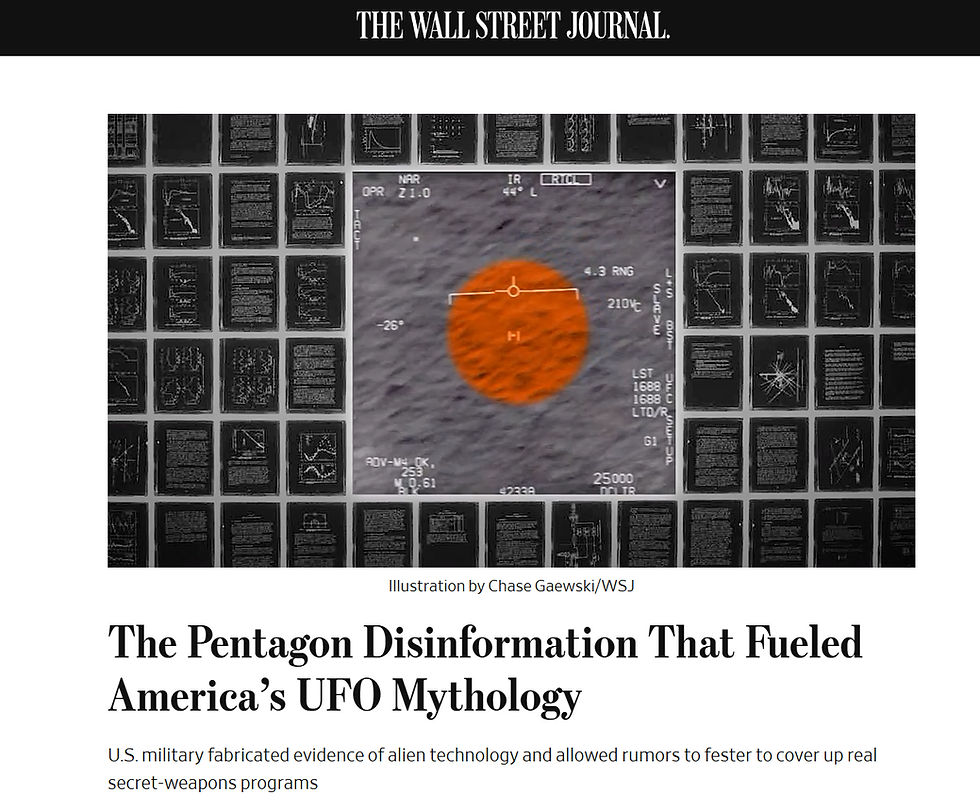Dead Presidents Still Control What You Know About UFOs
- Cristina Gomez

- Jun 26, 2025
- 3 min read
Updated: Jul 25, 2025
Investigative journalist Ross Coulthart recently conducted a comprehensive Q&A session on News Nation Reality Check that provided fresh insights into the complex world of UFO disclosure, government transparency, and the ongoing debate over classified technologies. His responses offer a unique window into what sources within the military and intelligence community are telling him about the current state of UFO investigations and the challenges facing potential whistleblowers.
Redefining What Makes a Legitimate Whistleblower
One of the most significant topics Coulthart addressed was the frequent criticism directed at UFO whistleblowers like David Grusch, who coordinate with Pentagon officials before making public disclosures. Critics often argue that such coordination disqualifies these individuals from being considered legitimate whistleblowers, but Coulthart presents a compelling counter-argument.
According to Coulthart, there’s a crucial distinction between revealing the existence of classified programs and exposing the specific operational methods used by intelligence agencies. He explains that figures like Grusch and Jake Barber can disclose information about UFO retrieval programs while still protecting sensitive capabilities that could benefit foreign adversaries if revealed. This approach, Coulthart suggests, demonstrates both patriotism and responsibility.

The coordination process with defense officials, rather than undermining credibility, actually strengthens it according to Coulthart’s analysis. These individuals follow proper legal channels, receive official whistleblower protection, and provide testimony under oath to Congress. This structured approach contrasts sharply with unauthorized leaks that might be dismissed as the actions of disgruntled employees or attention-seekers.
What makes these testimonies extra compelling, Coulthart notes, is that these are experienced intelligence professionals who have “everything to lose and nothing to gain” by coming forward. The personal and professional risks involved suggest that the information they’re revealing must be significant enough to justify such sacrifices.
Challenging Official Explanations
Coulthart also addressed the recent Wall Street Journal article that attempted to explain decades of UFO sightings as Pentagon disinformation operations designed to conceal conventional aircraft development. His response was unequivocal: he characterized the explanation as “absolute nonsense” that has been “pretty well debunked” by the UFO research community.

The journalist points out several fundamental problems with this narrative. First, it fails to account for the extensive witness testimony from military pilots, radar operators, and other personnel who have reported encounters with objects displaying capabilities that still exceed our current technological understanding. Second, it doesn’t explain incidents like the famous Nimitz encounter, where multiple sensor systems tracked objects performing maneuvers that remain beyond our ability to replicate.
Perhaps most significantly, Coulthart argues that this explanation contradicts the historical pattern of government responses to UFO reports. If these sightings were merely covering up conventional aircraft tests, he questions why the government would spend seventy years actively discrediting and ridiculing witnesses who reported them.
Coulthart views this Wall Street Journal piece as part of what he describes as a long-running disinformation campaign, though he observes that such efforts appear to be losing their effectiveness as more credible witnesses emerge and public skepticism of official explanations grows.
The Legacy of Cold War Classification
Throughout his discussion, Coulthart suggests that executive orders issued during the Truman or Eisenhower administrations continue to dictate current policy regarding UFO-related information, meaning that decisions made during the early Cold War era are still controlling what information reaches Congress and the American public today.

This situation creates what Coulthart describes as a fundamental tension between legitimate national security concerns and the principles of democratic oversight. His perspective is that unelected officials have essentially appointed themselves as the arbiters of what information elected representatives and citizens can access, potentially violating the constitutional framework of government accountability.
A Shifting Information Landscape
One of Coulthart’s most optimistic observations was his assessment that traditional methods of managing UFO-related information are becoming less effective. He notes that more credible witnesses are willing to come forward despite personal risks, and that serious journalists are conducting actual investigations rather than simply repeating official explanations.
This shift, according to Coulthart, represents a breakdown in what he calls the “old playbook” of dismissing UFO reports through ridicule and debunking efforts. Public skepticism of official explanations appears to be growing, while the quality and credibility of witnesses and evidence continues to improve.
As more information emerges through both official channels and investigative journalism, Coulthart’s reporting suggests we may be witnessing a historic shift in one of the most enduring and significant cover-ups in modern history. Whether this leads to full disclosure or merely a new phase in information management remains to be seen, but the traditional approach to UFO secrecy appears to be under unprecedented pressure from multiple directions.















Comments